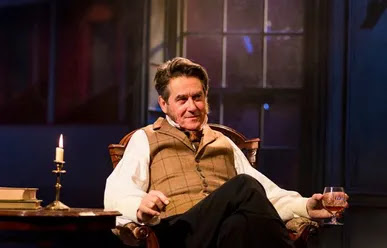By James V. Ruocco
In Jane Austen's celebrated 1813 novel "Pride and Prejudice," the character of George Wickham is an officer in the local military regime described as a noble, well-spoken gentleman who uses charm and dash to integrate himself into the lives of others. But in reality, he is a liar, a hypocrite and an opportunist who uses women for his own selfish pleasures and thinks nothing of ruining their reputation in upper class society.
He is also a gambler who has no scruples, runs up debts and then either disappears or runs away when he can't find the money to pay off those he has wronged.
Described by Austen as a man characterized by vicious propensities, Wickham, as the story continues, uses his friendship with the very wealthy Mr. "Fitzwilliam" Darcy for strictly monetary means (he asks Darcy to lend him money to pay off his debts). But when Darcy refuses, Wickham seduces Darcy's sister Lydia, a boy crazy, dangerously naive 15-year-old girl as payback with plans to steal her fortune following an organized elopement. Trapped in a dysfunctional marriage, Wickham not only loathes Lydia, but finds himself living a very lackluster life - the result of lies, deceit and completely selfish, offensive actions and choices.
Wickham's voice, the events at Pemberly and the haunted and scandalous memories of his past are the literary centerpiece of "Being Mr. Wickham," a one-man play that steps back in time to find the now 60-year-old character ready to "tell all" about his extraordinary life.
"I had charm," he tells us.
"I might be the villain of my own story."
"I've gambled with men and slept with most of their wives."
"I'm very much alive and can pass for forty on a very good day."
Extraordinary.
Riveting.
Personal.
Revelatory.
Truthful.
Dynamic.
"Being Mr. Wickham" succeeds largely due to shrewd channeling, brilliant conversation, lucid storytelling, emotional flashiness and beautifully sustained artfulness that enhances its palpable journey, its unassuming nature and its well-crafted melodrama.
Co-authored by Adrian Lukis (he plays George Wickham in this production) and Catherine Curzon, the play continues the story of Austen's popular character, interweaving dialogue and narrative with agreeable revelation, originality and compassion. It's all very well patterned and positioned in true storytelling smartness containing the right blend of humor and darkness and seemingly smooth wisdom and practicality that you can't help but notice. It is also blessed with the kind of intellectual and profound verbiage that makes you cling to every word that comes out of Wickham's mouth. However, to fully appreciate "Being Mr. Wickham," you must listen to every word without any kind of distraction. Simply take a deep breath, put the wine bottle and half-filled glass off to the side and let Lukis and Curzon seize the day (or night), so to speak.
The stirred emotions and enticing options of "Being Mr. Wickham" are portrayed in respectable, distinguished fashion by Guy Unsworth, a smart, significant director who gives the piece a vivid sense of time and milieu, an enticing mix of humor, drama and madness and a faultless mindset rife with compassion, compliment and credibility. One-man plays are not the easiest works to stage, but Unsworth's competent understanding of the text, its main character and the rhythmic patterning of its individual scenes gives him enough fire and fuel to keep the production moving at a steady pace and pique viewer interest for its entire 56-minute running time. The process, which mixes theatrical staging with that of cinematic invention allows him to capture the reality of the main character, the actual moment in time and place and the progression of the story without stagey camerawork and unmotivated cues and conventions. Here, things are raw and truthful and often framed against the backdrop of the Theater Royal's eye-catching Regency theatre design, a conceit that heightens the observational verite of the subject matter.
As George Wickham, Adrian Lukis offers a mesmeric performance that memorably captures the character's emotional wounds, his healing, his aches, his authority, his sexuality and his proud and not-so-proud memories of a life and career that is not easily forgotten. An actor capable of inherent personality and vocalism, his monologues, confessions, dramatic flourishes and haunted mysteries keep the viewer transfixed by magnificent acting choices, offset by his ability to switch gears in a single millisecond, ready to reveal yet another memory or thought with unflinching honesty and undiluted reality. It's a artist's gift that tells us everything about the explored and mysterious life of a man, aptly named George Wickham.
A thoughtful and intelligent one-man play, "Being Mr. Wickham" is a wonderfully orchestrated theatrical achievement rich in irony, persistence, conversation and ambition. Adrian Lukis, in the role of George Wickham, delivers an intensely invigorating performance that is imaginative and refreshingly personal. The script, co-authored by Lukis and Catherine Curzon, resonates with choice philosophies and ideals that are both light-hearted and dark. Director Guy Unsworth, using the elegant surroundings of the Theater Royal as his backdrop (this Regency theatre is ideal for his form of storytelling), offset by Libby Watson's handsome period design, crafts an edgy, intimate production full of surprise, insight and clarity that continues the story of George Wickham with a caring attitude and pulse that prompts immediate attention and reaction, most agreeably.
"Being Mr. Wickham," produced by the Original Theatre Company, is now available to be streamed on demand from May 11, 2021 through August 11,2021. Tickets are £20 and £22.50 (includes digital programme). For paid and free content, you must register and create an online account. Once you are logged in, you can watch and purchase the production. You can view "Being Mr. Wickham" on any device with an internet connection and browser. To do this, just enter the URL - originaltheatreonline.com/login - and submit the details you have been given above. This is a live performance and must be watched at 3:00 p.m. or 7:30 p.m.













